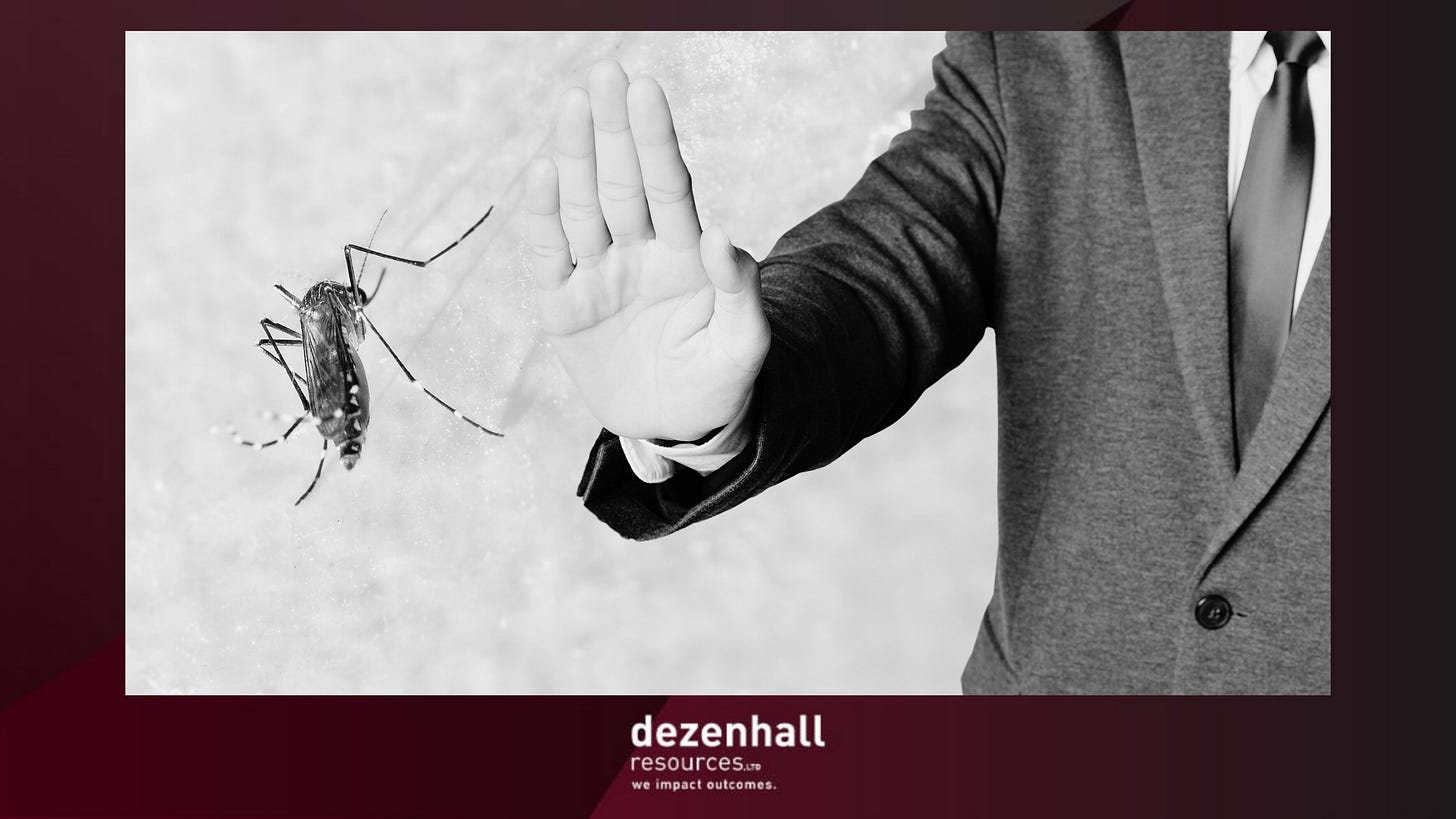Dez Reads. We Are Finally Poisoning the Mosquitoes.
Hello Dez Readers – I have to walk out the door to chaperone a 4th grade field trip to Fort Meigs. I’m pretty jazzed about it, but because I’m late, I’m going to turn the intro over to Mark Emerson today. But before I do that, I would like to express my support for poisoning all mosquitoes, as Anne Marie explores this week.
Thanks, Josh. I’ll take it from here.
As Josh mentioned, Anne Marie kicks us off with what might be the best news of the summer – scientists have found a drug that turns human blood into mosquito poison.
Josh brings us a parenting win with Nickelodeon’s new family-friendly podcast lineup that might just save your car rides from the 9,000th replay of the Paw Patrol theme song. Jen Hirshon dives into the depths with a fascinating look at how two underwater robots named Romeo and Juliet helped create the most detailed map of the Titanic ever made.
Mike Bova serves up some comfort food for thought with a breakdown of why America is breaking up with casual dining chains. And Annie Moore closes things out by pitching a pageant reality show idea after diving into how tariffs and cost pressures are reshaping the streaming industry.
It’s a weird, wonderful mix this week, just as we like it.
As always, thanks for reading along with us.
Here we go.
Health.
BGR. Scientists found an existing drug that turns human blood into mosquito poison
Every summer BBQ has that one person who takes the brunt of the party’s blood-sucking uninvited guests – mosquitoes. For as long as I can remember, that person has always been me. Deet, Off!, lavender, professional mosquito fogging – none of it makes a dent. You can understand why this article piqued my interest.
A recent study shows that a “potentially game-changing approach to stopping malaria that involves turning human blood into a death sentence for mosquitos.” The approach? Nitisinone, which was discovered by the Liverpool School of Tropical Medicine in three patients treated with Nitisinone for a rare genetic condition.
There isn’t a lot here about what Nitisinone does, what the human side effects are, etc. However, the findings are clear – every mosquito died within 12 hours. At a societal level, this could be game-changing in addressing the deadly disease mosquitoes carry for humans and other animals. Selfishly, as a preferred target, with mosquito season around the corner, this is welcome news.
– Anne Marie Malecha
Media.
AdWeek. Nickelodeon Partners With Starglow For Family-Friendly Podcasts
I belong to a cohort of dads who are fed up with screens. We believe that while technology is good and is changing the way our kids learn and interact in some very positive ways, there is a lot of addictive junk out there that is wrecking our kids’ brains, 15 seconds at a time.
But an outright ban on our children using YouTube, Xbox, and texting would essentially cut them off from their social circles. The world is what it is, so we need to adapt in the best interests of our kids. As Marlo Stanfield said in The Wire, “You want it to be one way. But it’s the other way.”
Enter podcasting – the preferred medium for those of us who wish to use the internet to deliver deeper, longer-form content. AdWeek cites survey data suggesting that 10 percent of preschoolers listen to podcasts, but 80 percent of parents are interested in listening to podcasts alongside their kids. Nickelodeon is thus building out a podcast platform highlighting some of its blockbuster kids shows like Paw Patrol and Dora the Explorer.
I would have personally leapt at the chance to switch off the Paw Patrol soundtrack in favor of a podcast when my kids were smaller. If not only for some diversity of audio on car trips, but also to shift their attention from short-form junk to something that requires a bit more focus and attention. The youth podcasting market shows a lot of promise for parents and kids that are interested in something a bit deeper than TikTok.
– Josh Culling
Technology.
NatGeo. A new deep-sea map reveals the Titanic in never before seen detail
The Titanic remains a profound fascination for many (myself included), as it was a ship that sank slowly and carried a passenger list that read like a “who’s who” of the time. Over the years, numerous expeditions have ventured to the site, uncovering new details that deepen our understanding of this maritime tragedy. However, not all excursions have been successful; the ill-fated OceanGate Titan submersible serves as a reminder of the dangers of neglecting safety and risk management. It’s an avoidable disaster that offers a poignant lesson in crisis prevention.
Fast-forward, a new National Geographic documentary, Titanic: The Digital Resurrection, will premiere Friday (today) at 9 pm ET and will shed new light on the Titanic’s final moments, leveraging innovative techniques that allow researchers to virtually walk through the wreckage. This remarkable achievement is made possible by two robots, Romeo and Juliet, which scanned the site from every angle, capturing over 700,000 photos and millions of laser measurements in just three weeks.
This technological feat enhances our knowledge and significantly improves the safety of future explorations, allowing us to explore the depths of history without risking lives.
Ahoy, Captain!
– Jen Hirshon
Business.
CNN. America has lost its appetite for casual dining chains
The decline of the sit-down chain restaurant feels like the end of an American era. Red Lobster, TGI Fridays, Hooters – they were once weekend staples. But now, these legacy chains are no longer the go-to spots they once were, and the change isn’t just about the food on the plate.
Delivery apps and streaming services have made staying in not just easier – but preferable. Sadly, for a lot of people, the idea of sitting across from someone at a table and making conversation isn’t as preferable as watching the latest White Lotus episode. The dinner table is being replaced by the couch, and connection is taking a back seat to convenience.
To add insult to injury, fast-food brands are swooping in to take over these vacant restaurant locations at a discount. Good proven locations that once attracted customers, with big parking lots, and a built-in infrastructure are way better options than starting from scratch.
Some chains are trying to adjust. Chili’s, for instance, has invested more than $400 million into simplifying their menus and maximizing efficiency at their locations. And it’s clearly working considering they saw a 31% increase last quarter, the third straight quarter of double-digit sales growth for the restaurant.
There’s still an opportunity, but it’s not in trying to bring back what worked 20 years ago. It’s in understanding what people actually want now, and meeting them there.
– Mike Bova
Entertainment.
AdWeek. 5 Ways Tariffs Are Set to Transform the Streaming Industry
If you got an “out of office” last week from me, it’s because I was competing in a pageant. You may be wondering, “What on earth does that have to do with tariffs and streaming?”
Let’s get into it.
Since 2020, when COVID-19 shut down much of Hollywood and we subsequently saw the biggest writers’ and actors’ union strikes in modern history, reality TV has taken off. It’s cheaper to produce, there are plenty of opportunities for advertising, and the “talent” is not nearly as expensive as professional actors. From dating shows to the process of becoming a Dallas Cowboys cheerleader, we’ve seen these content houses and streaming platforms prioritize reality TV at a nearly unprecedented level. Enter me and my wack ideas.
Prior to this year, I had competed in two pageants, and that experience sparked a thought in my advertising brain. A pageant reality TV show. So, I embarked on a journey to build some credibility in the pageant world, documenting my journey along the way. Now, it’s time to pitch this idea to a studio that is prioritizing reality show content at a time when costs for scripted TV will continue to rise.
Stay tuned for where this ends up.
– Annie Moore
Don’t forget to check out the latest monthly issue of Our Take!


